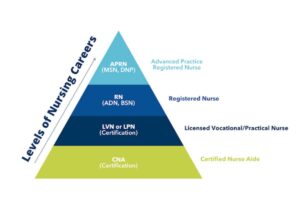Levels of Nursing Explained

Many people choose to go into nursing because of the almost unlimited potential for professional growth. There are many levels of nursing, including entry-level positions that all provide comprehensive patient care at various healthcare facilities.
Different nursing levels have different educational and licensing requirements. They also have different responsibilities in terms of patient care. For example, a certified nursing assistant (CNA) will not have the same duties as a registered nurse (RN).
If you’re interested in pursuing nursing career paths, you may be wondering, Exactly what are the levels of nursing, and what makes them different from one another? Great question.
It can be helpful to learn about the different levels of nursing so that you’ll have a better understanding of your potential journey. Keep in mind that you don’t have to take nursing step-by-step: You may instead choose to enter the profession at any entry level since they don’t usually require extensive experience.
Level 1: Certified Nursing Assistants (CNAs)
Like other types of nursing professionals, CNAs make up the backbone of the healthcare profession. In many cases, CNAs work in facilities offering long-term care, such as assisted living or a rehabilitation clinic. In some states, CNAs are referred to as licensed nursing assistants (LNAs), state registered nursing assistants (SRNAs), or state-tested nursing assistants (STNAs).
CNA Requirements
The educational requirements to become a CNA aren’t as lengthy or comprehensive when compared to other types of nurses. You’ll need to already have your high school diploma or GED and could already be working as a caregiver or as a patient care assistant (PCA). Then, you’ll need to complete an accredited certified nursing assistant training program. These are often offered at community colleges and, in some cases, healthcare facilities. Training typically only takes a few weeks.
After completing the program, you’ll take an exam to receive your nursing assistant certification. Passing this exam prepares you to begin working. Wherever you’re employed, you’ll perform several important patient care duties, such as taking vital signs and helping patients bathe and dress. You’ll work under the supervision of a licensed practical nurse or registered nurse.
5 Great CNA Programs
- Columbus State Community College
- Salt Lake Community College
- Lone Star College System
- Pima Community College
- City College of San Francisco
CNA Career Options
In terms of CNA career paths, you can further your own by receiving additional certifications. This may permit you to be able to take on more shifts for a potentially higher rate without needing to move to the next nurse level. For example, you can become a certified medication aide (CMA), which has all of the same duties as a CNA, but you are authorized to administer certain medications to patients.
CNA Salary
The average salary for CNAs is $39,610 per year, or $19.04 per hour. The job outlook for nursing assistants over the next decade is as fast as the average estimated growth for all other occupations.
See all CNA jobs and medication aide jobs on IntelyCare.
Level 2: Licensed Practical Nurses (LPNs)
The next of the levels of nursing is the licensed practical nurse (LPN). In some states, this same role is known as a licensed vocational nurse (LVN).
LPNs complete patient care tasks that are typically more involved than those performed by CNAs, although some duties may overlap. As an LPN, you’ll hold more responsibility for care provided. You may perform tasks like taking vital signs, changing bandages, administering medications, or starting IVs. Most LPNs work closely with registered nurses and other healthcare professionals.
LPN Requirements
The educational requirements to become an LPN are similar to those of CNAs, although LPN training programs are generally more intensive. You don’t need an advanced degree to become an LPN, although you will be required to complete a training program geared toward licensed practical nurses. Such programs may take up to a year to complete, and you’ll need to take the NCLEX-PN licensing exam afterward to start working.
5 Great Schools for LPN Programs
- Lake Area Technical College
- Northland Community and Technical College
- Holmes Technical College
- Utah State University
- South Florida State College
LPN Career Options
LPNs and LVNs often work in long-term care facilities and acute care, providing basic patient care to those in need. However, LPNs can work in a number of settings, including doctors’ offices, hospitals, schools, and clinics.
LPN Salary
The average salary for LPNs is $60,790 per year, or $29.23 per hour. The LPN job outlook over the next decade is faster than the average estimated growth for all other occupations.
See all LPN jobs and LVN jobs on IntelyCare.
Level 3: Registered Nurses (RNs)
Of all entry levels of nursing, the highest is that of the registered nurse. You don’t have to be a CNA or an LPN before you become an RN, although it can be very helpful to have that experience first.
As the highest of the entry levels of nursing, RNs are responsible for more than LPNs and CNAs. Your RN duties may include assessing patients, performing diagnostic tests, administering treatments and medications, providing education to patients and families, and communicating with all other members of the healthcare team. You’ll also be responsible for accurate, appropriate documentation of the patient’s condition and response to treatment.
RN Requirements
Registered nurses have the most stringent educational requirements of any of the entry nursing levels. An associate degree in nursing (ADN) or a bachelor of science in nursing (BSN) is required to practice as an RN. There are some key distinctions between these two degree options. Both degree programs usually take several years to complete — typically two years for ADN and four years for BSN — and you’ll still need to pass the National Council Licensure Exam (NCLEX) before you can work. However, BSN is a more comprehensive nursing education, and some employers may prefer to hire nurses with a BSN.
RNs work in many healthcare settings, including hospitals, long-term care facilities, medical offices, and nursing homes. There are also a variety of nursing specialties you can pursue to enhance your education and sharpen your skill set.
5 Great Schools for a BSN Degree
- Duke University
- University of Pennsylvania
- Emory University
- The Ohio State University
- University of Iowa
RN Career Options
Some RNs eventually go on to become nurse managers where they work. Nurse managers make sure each nursing unit runs smoothly and that each member of the staff has the resources they need to succeed. It’s important for nurse managers to have strong leadership and administrative skills since they’ll be used every day.
Beyond these positions, there are also several advanced levels of nursing in the profession. However, these three entry-level positions provide the foundation for the profession as a whole. Which one you choose ultimately depends on your career goals, but all can lead to a successful, rewarding career.
RN Salary
The average salary for RNs is $94,480 per year, or $45.42 per hour. The RN job outlook over the next decade is faster than the average estimated growth for all other occupations.
See all RN jobs on IntelyCare.
Level 4: Advanced Practice Registered Nurses (APRNs)
If you want to further your career in healthcare, the next step you can take after being an RN is to pursue advanced levels of nursing degrees.
APRN Requirements
Start by earning your master’s degree in nursing (MSN) or doctor of nursing practice (DNP) to become an APRN. You’ll then have to pass a certification exam from an accredited national body, such as the American Midwifery Certification Board if you were to be a nurse midwife, and apply for your license. Not only will you amass more critical knowledge as an APRN, you’ll also open yourself up to a bunch of other career options.
APRN Career Options
Examples of advanced nurse positions include certified registered nurse anesthetist (CRNA), certified nurse midwife (CNM), nurse practitioner (NP), and clinical nurse leader or specialist. Each of these roles has its own defined career path, as well as scope of duties and salary expectations. For example, in addition to performing all the usual tasks of an RN, a nurse practitioner can also diagnose and treat patients, order tests, and prescribe medication in some states. Learn more about the difference between an NP vs. RN.
APRN Salary
The average APRN salary depends on your job title.
- Nurse anesthetists earn an average of $214,200 per year.
- Nurse midwives earn an average of $131,570 per year.
- Nurse practitioners earn an average of $128,490 per year.
The APRN job outlook over the next decade includes expected growth at a whopping 38%, which is much faster than the average estimated growth for all other occupations.
See all CRNA jobs, nurse midwife jobs, and nurse practitioner jobs and on IntelyCare.
Master’s Degrees in Nursing
One way to grow professionally is to pursue further education, particularly a Master of Science in Nursing (MSN). As mentioned previously, earning your master’s degree can open up the door to become an APRN. Many administrative and leadership positions also require a MSN to qualify.
5 Great Schools for a Masters in Nursing
- Emory University (Woodruff)
- Johns Hopkins University
- University of Pennsylvania
- Duke University
- University of Washington
There are a number of nursing master’s degrees to choose from. Here are a few to consider:
Nurse Educator: Learn best practices for teaching prospective nurses at a range of levels.
Nurse Administrator: Discover how to manage the smooth operation of a unit in a range of healthcare settings.
Clinical Nurse Leader: Learn to coordinate care and facilitate clear communication between departments within an organization.
Nursing Research: Find out how to conduct experiments to improve the quality of nursing and patients’ experiences.
Nursing Informatics: Figure out how to develop technology and communication systems utilized in healthcare.
Nurse Anesthetist: Receive training about how to safely administer anesthesia to patients.
Nurse Midwife: Learn how to care for women during their reproductive years, pregnancy, and childbirth.
Nurse Practitioner: Explore how to diagnose and treat conditions, prescribe medication, and order testing in a range of specialties.
Public Health: Find out how to address health issues at the local, regional, national, and global levels.
Doctorate Degrees in Nursing
After completing a master’s degree, you can extend options for your nursing career paths even further by entering a nursing doctoral program. This is the highest level of nursing and is held by many of the most influential nurses in hospital leadership, healthcare research, and public policy. You can become either a Doctor of Nursing Practice (DNP) or a Doctor of Philosophy in Nursing (PhD) at this level.
5 Great Schools for a DNP Degree
- Johns Hopkins University
- Columbia University
- Duke University
- Rush University
- University of Washington
DNP
A nurse with a DNP is often focused on leadership in clinical practice and can take a career path to becoming a Chief Nursing Officer (CNO) or Nurse Executive (both pay a median salary of just over $250,000). These nurses keep hospitals, long-term care facilities, and private practices running efficiently. This level of management also is referred to as health care executives.
PhD
While a DNP focuses on clinical practice, the nursing career paths for a PhD are usually more research and science focused. The top universities and medical schools hire nursing professors that have PhDs in nursing. A nurse researcher with a PhD conducts medical research that can lead to breakthroughs in nursing care.
The median salary for nursing professors is $86,530. The median salary for a nurse researcher is $97,350.
See all nursing jobs on IntelyCare.

Image: texarkanacollege.edu
Nurse Levels FAQ
What are the five levels of nursing experience?
The five levels of nursing experience are novice, advanced beginner, competent, proficient, and expert. The levels were introduced by Dr. Patricia Benner in 1984 to explain the skills that nurses acquired as they advanced through their studies combined with experience.
What is the highest level of nurse?
The highest level of nurse in terms of education is a nurse with a doctoral degree (DNP). The highest level of nurse in terms of job title is the executive role of chief nursing officer (CNO).
Where do nurses make the most money?
The states that pay the highest average annual RN salaries are:
What’s the difference between an RN and BSN?
While RN refers to a nursing license, a BSN is a degree (bachelor of science in nursing) a nurse earns in school. All RNs have at least an associate degree (ADN), as that is the minimum required to apply for nursing licensure. But nurses with either an associate degree or a BSN can have RN licensure.
Find the Right Job for Your Skills
There are lots of great jobs for many levels of nursing, but it can be difficult to sort through them all. Need some help? Discover how IntelyCare can pair you with nursing jobs that align with your interests and talents. Get started today.

